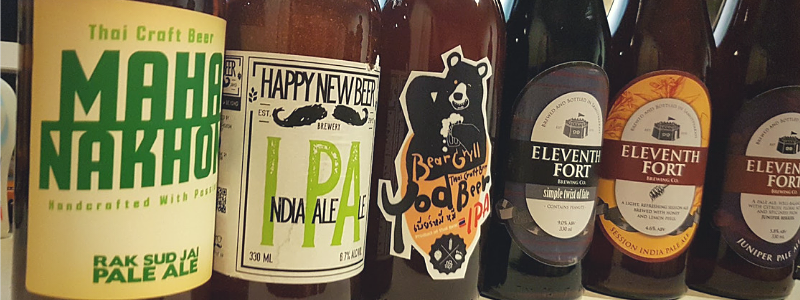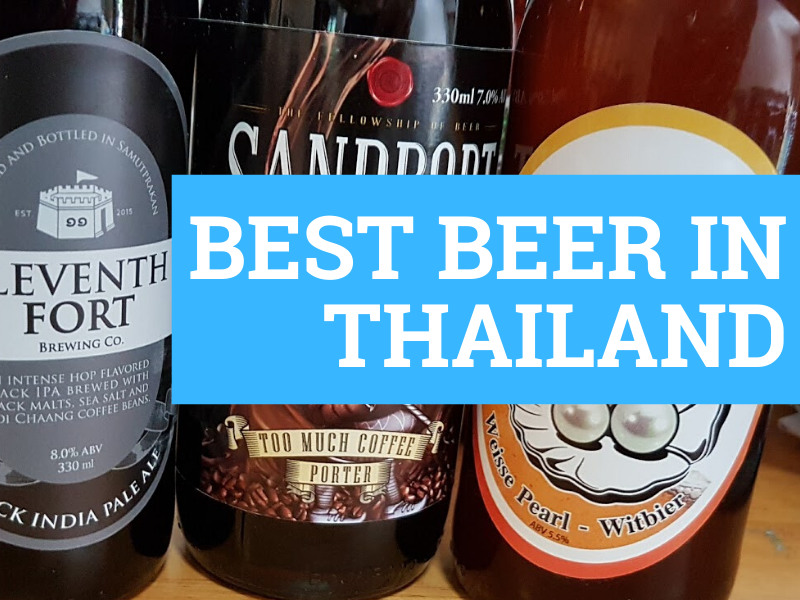Spoiler Alert: If you’re seriously expecting a simple answer to ‘What’s the best Thai beer?’ then you’ll be disappointed. And if you’re expecting this to be another ‘best Thai beers’ blog that extols the virtues of mainstream beers you buy in the 7-eleven, you’ll also be disappointed.
So if you want to learn something, read on, this might be interesting for you. :-)
Breweries in Thailand
Before getting to the best beers, it’s worth looking at the main breweries in Thailand.
Two conglomerates dominate the mass market Thai beer market and they are also attempting to introduce low cost ‘craft’ beers to try to turn craft beer loving Thais back to one of their brands.
Boon Rawd Brewery is the oldest and largest brewery in Thailand. It was founded in 1933 and produces Singha, Leo and My Beer. Overall it has around 60% of the total beer market.
ThaiBev, the brewer of Chang, Archa and Federbrau is the other major player, with around 35% market share
Thai Asia Pacific Breweries is a large brewery, but not in the same league as the others. They brew foreign beers in Thailand – Heineken, Tiger and Cheers – and have around 4% market share.
Finally, way down at the bottom are the independent brewers who have under 1% market share. This is the premium imported and craft beer market.
There is a simple reason why craft beer isn’t as ubiquitous in Thailand as it is in Europe and even elsewhere in South East Asia. Big business is protected by the law.
In 2000, a regulation was issued under the Liquor Control Act, a law dating back to 1950. This states that in order to be eligible for a brewing licence, a company must produce more than 10 million litres per year. To give you an indication of what that means, an article in the Bangkok Post, estimated that to start up a new brewery which could do this would cost around 1 Billion Baht. This also includes all the associated expenses of setting up distribution networks, advertising etc. So it’s not really a viable option.
Brewpub owners are obliged to produce at least 100,000 litres and no more than 1 million litres per year. But they cannot sell their brews as bottled products outside the brewpubs. So it isn’t surprising that there are under 20 legal brewpubs in Thailand.
Interestingly, the big breweries are also Thailand’s top producers of soda water and bottled water. Which at first seems odd, but isn’t when you understand that although laws protect the brewers, they also make it very hard for them to advertise their products. As the advertising of alcoholic beverages was banned back in 2008.
So when you see a billboard or sign for Singha, Leo or Chang. It isn’t actually advertising the beer, although you subconsciously know it is. It’s really advertising their own brand of drinking water or soda water – which just happens to have the same logo as the beer. :-)
Most Popular Beers in Thailand
As mentioned above, two companies control the beer market and their beers are the most popular.
Singha Beer is the oldest brewery and until the early 2000s it was by far the most popular. There wasn’t any real competition. Singha controlled the beer market in Thailand and, what is now ThaiBev, controlled the spirits industry. They had a monopoly on locally produced whisky and rum – with famous brands such as Mekhong and SangSom.
ThaiBev’s move into producing beer came with a partnership with Carlsberg in 1995. They produced their well known Elephant beer in Thailand. This explains why the Beer Chang logo uses a similar font to Carlsberg and why the beer is called ‘Chang’ – as that’s the Thai word for elephant. After 5 years, ThaiBev ended the partnership and Carslberg wasn’t seen in the country for another 15 years or so.
So ThaiBev now had a nationwide distribution system and their own beer. The problem was Singha had virtually all the market share and trying to knock them off their perch by just advertising and promoting Chang would be very expensive. A far more cost-effective tactic was required.
The solution was surprisingly simple and very cheap to implement. Distributors and shops who bought spirits from ThaiBev now had to buy cases of Chang beer with their order. The amount of Beer Chang they had to order was in proportion to the amount of spirits. They couldn’t say no. As there was nowhere else to buy cheap spirits from.
Of course the wholesalers and shopkeepers didn’t really want cases of Chang. So they sold it at cost price just to get rid of it. And that price was about half the price of Singha. Almost overnight, Chang took a huge chunk of Singha’s market share.
And it could have ended there. But Singha fought back, and rather than take their flagship product downmarket, introduced their own low cost beer – even cheaper than Chang, called ‘Leo’. This was also brewed specifically to suit Thai tastes. Leo has a bit less alcohol and is a bit sweeter and smoother than Chang.
It proved popular and first overtook Singha before going on to become even more popular than Chang. This was helped by Chang having some quality control issues with alcohol contents varying wildly between batches. Which in turn led to the infamous ‘Changover’ – a term coined to describe the after effects of a few Beer Changs.
Today Leo Beer is the most popular beer in Thailand with around 53% market share.
Beer Chang is second with 34%, Singha third on 7% and Heineken fourth with 4%. All other beers fight it out for 2% of market share.
Personally, Singha always gives me a headache. I like Chang if it’s ice cold. But Leo is probably the smoothest and most drinkable. These four beers are the best selling in Thailand but definitely not the best beers.

Craft Beer in Thailand
Craft beer is trying to take hold in Thailand, however, strict laws and harsh penalties for home-brewing stifle the industry. But it’s rise does have the big players worried. over the past few years Boon Rawd and Chang have introduced their own copy-cat versions of imported or craft beer styles. So nowadays in the 7-eleven, priced higher than regular Thai beers, you’ll see the likes of ‘Snowy Weizen’ and ‘Est 33 Copper’ . The former is supposed to be a cloudy wheat beer. It tastes how you’d imagine cheap, fake Hoegaarden to taste. The latter is an amber beer made with a type of brown rice and not worth spending money on.
But take a look in any supermarket, especially in urban areas, and you’ll find an ever increasing range of Thai craft beers for sale. However, there’s a problem calling them Thai craft beers. Because although they are brewed by small Thai companies, owned by Thai nationals and the beer is only sold in Thailand . . . it’s brewed abroad. This is due to the law I mentioned earlier in the article which makes it virtually impossible for independent brewers to legally make their own beer in Thailand.
Thai Craft Beer isn’t Made in Thailand
So brewers have to make their beer abroad and then import it into Thailand, where they get hit with high import duties. This in turn means that prices for Thai craft beers are way higher than you might expect. The cheapest Thai craft beer is around three times the price of a Leo beer. So for many Thais, paying 100 Baht in the supermarket or nearly 200 Baht in a bar isn’t something they would do, when a Chang or Leo sell for 35 Baht in the 7-eleven or 60 – 70 Baht at a restaurant.
To give an example. Stonehead is a popular Thai craft brewery. They make some very nice beers, as good as many you will find in Europe or the US. They have their own brewery in Cambodia. If you are in Cambodia you can buy direct from the brewery. A 330ml bottle is around 50 Baht or so. Once the beer has been shipped back into Thailand and taxes applied, the same bottle sells for around 150 Baht in a supermarket. The flight of Thai brewers to neighbouring countries was highlighted in the Bangkok Post article ‘Small brewers pour into Vietnam‘
It’s also something that most foreign tourists won’t do. Alcohol is very cheap in most European countries compared to Thailand. So the average tourist isn’t going to pay 200 Baht for a bottle of Thai beer when they can have Leo, Singha or Chang for way less. And if they prefer ‘real’ beer, they will wait until they get home and buy it much cheaper there. The market for craft beer is relatively small.
Thai craft brewers usually start off by perfecting their own illicit homebrews and selling them in local craft beer pubs or by mail order on Facebook etc to the beer loving fraternity who are eager to try something new. But once their beers begin to get well known, they have to look at ways to brew abroad. Cambodia and Vietnam are the main locations Thai craft beers are actually brewed. But some are made as far away as Australia.
Where to Try Thai Craft Beer?
You’ll find craft beer pubs in most towns in Thailand now. They usually won’t be very big but will be run by knowledgeable Thais, many of whom have traveled extensively and will happily discuss their favourite English, German, American beers with patrons. Most beers for sale will be imported western brands but their will also be some Thai names there too.
But if you’re in Bangkok and have time then two places to visit are either Chit Beer on Koh Kret, to the north of the city centre or Mitr Craft on Phayathai Rd, right by a skytrain station. Both are run by a guy called’ Chit’ – who is regarded as the father of Thai craft brewing. (There’s more about Chit in this Asia Times article from January 2020. )

Chit Beer
Chit is an interesting guy. He runs a small brewpub on Koh Kret, an island in the middle of Chaopraya river just north of Bangkok city centre. It’s an out of the way location and his business is only open at weekends. So despite being raided by police about 8 times over the years he can continue in business. He also teaches classes in brewing and the beers for sale are all technically illegal. So ‘Chit Beer’ is where most Thais who want to learn how to make beer will go for classes. And many larger brewers got their start by making batches at his bar and selling them to patrons.
Chit isn’t your normal revolutionary. His bar is only open at weekends because during the week he has a day job. He’s a Colonel in the Thai army and teaches electrical engineering at the elite Chulachomklao Royal Military Academy, the alma mater of most senior Thai military officers and several prime ministers. And he owns a couple of IT businesses which helps to finance the craft beer hobby.
Mitr Craft is a project established by Chit. Six Thai craft breweries Chit Beer, Devenom, Wizard Beer, Red Stone, Lazy Fat Cat and Mickleheim. The objective is to create a platform to improve the quality of craft beer to international standards. Mit Samphan Brewery is their own brewery where anyone can come to brew their own beer. This is then sold in Mitr Bar.
Chit Beer Facebook (information in Thai & English)
Mitr Craft Facebook (information in Thai & English)

The Best Thai Craft Beers
There are now around 80+ Thai craft beer brewers. Most of them just sell from their own Facebook sites or in pubs in their own towns.
There’s a good list of most of brewries and their various beers on Ratebeer But I don’t think anyone will agree on which beer is the best.
Of these the best known, which you will find in some supermarkets are Devanon, Full Moon, Stonehead, Sandport, Wizard Beer, X Beer, Triple Pearl, THER, Eleventh Fort, Space Craft, Lazy Fat Cat, Changwon Express and Outlaw. All are worth trying if you want a change from the Chang / Leo / Singh mass market.
Most brewers stick to IPAs. As there’s no point trying to make anything like wheat beer, which Thais like but German’s already do to perfection. And German wheat beer Weihenstephaner, Paulaner etc is sold widely as it goes well with spicy Thai food. And Thais drinkers, on the whole, don’t like anything too bitter or sour. Gloopy 10 – 12% stouts, although smooth and delicious, aren’t so popular either, mainly because they knock you out after one glass. IPAs can have many different tastes and so there’s plenty of room for new beers and variations.
Three To Try
Eleventh Fort Black IPA – One of the first Thai beers that I had, back in 2015. Back then they were making beer in small batches at an undisclosed location in Samut Prakan and selling it on Facebook. They got a reputation for quality over quantity. This black IPA is made with black malts, sea salt, and Doi Chaang coffee beans from the north of Thailand. Facebook / Website
Outlaw Mosaic (Or Showdown) This is basically a Mosaic hop bomb. Delicious. Showdown is a bit more grown up. Both won awards at the 2018 Asia Beer Championship. Outlaw is based in Loei in northern Thailand and run by a Canadian microbiologist. Facebook / Website
Devanom Nonthaburi Mead. I never thought I’d be drinking a Thai mead. But if it’s good enough for ancient Greeks, Africans and Chinese then it’s good enough for me. It’s actually the ideal hot weather drink. Not too sweet, only around 4% alcohol, and super drinkable. They also make a sour mocha version, which is interesting. Facebook
Thai Licensing Laws
Finally, it’s worth mentioning that that there are quite a few days a year when the sale and purchase of alcohol is banned. And there are also restrictions on the times that shops can sell alcohol.
Thailand is a Buddhist country, and law prohibits the sale of alcohol on Buddhist holidays. So if you’re wondering why a shop won’t sell you a beer or bottle of wine on a particular day, this might be it.
However, the times that shops and supermarkets can sell beer is also tightly controlled. Alcohol may only be sold between 11:00 – 14:00 and 17:00 – 00:00. Of course, hotels, restaurants and bars can apply for licenses to sell throughout the day. So you can still get a beer or cocktail at your hotel’s pool bar mid-afternoon. And clubs can serve booze until 2am.
For any younger backpackers, the legal drinking age in Thailand is 20 years of age. So whilst it’s no problem for an 18 / 19 year old drink in Europe, it would be in Thailand if the police decided to check. That’s unlikely to happen. In reality the staff in a 7-eleven or any bar aren’t going to question a foreign tourist’s age or ask for ID.
Resources
Everything Bangkok Beers – Mostly expat Facebook group and good place to find out what’s new and available in Bangkok.
BeCraftBeer.com – Nice project whereby small brewers get together and crowdfund their new brews. Beer fans can order a case or two in advance with a mix of any of the beers at a discounted price. This covers the production costs. The beers are then brewed, usually just over the border at Stonehead’s brewery in Koh Kong, Cambodia. Advance customers get their beers. And excess is sold through a chain of partner craft pubs which are listed on the website. It’s a good, risk-free way for small batch brewers to test new products. And a great way for beer lovers to try something different.
Thaicraftbeers.com – Excellent site with lots of reviews of craft beer bars and Thai beers.
Brewing up trouble with Bangkok’s rebel beer buffs – Bangkok Post feature from 2015 with lots of background information




